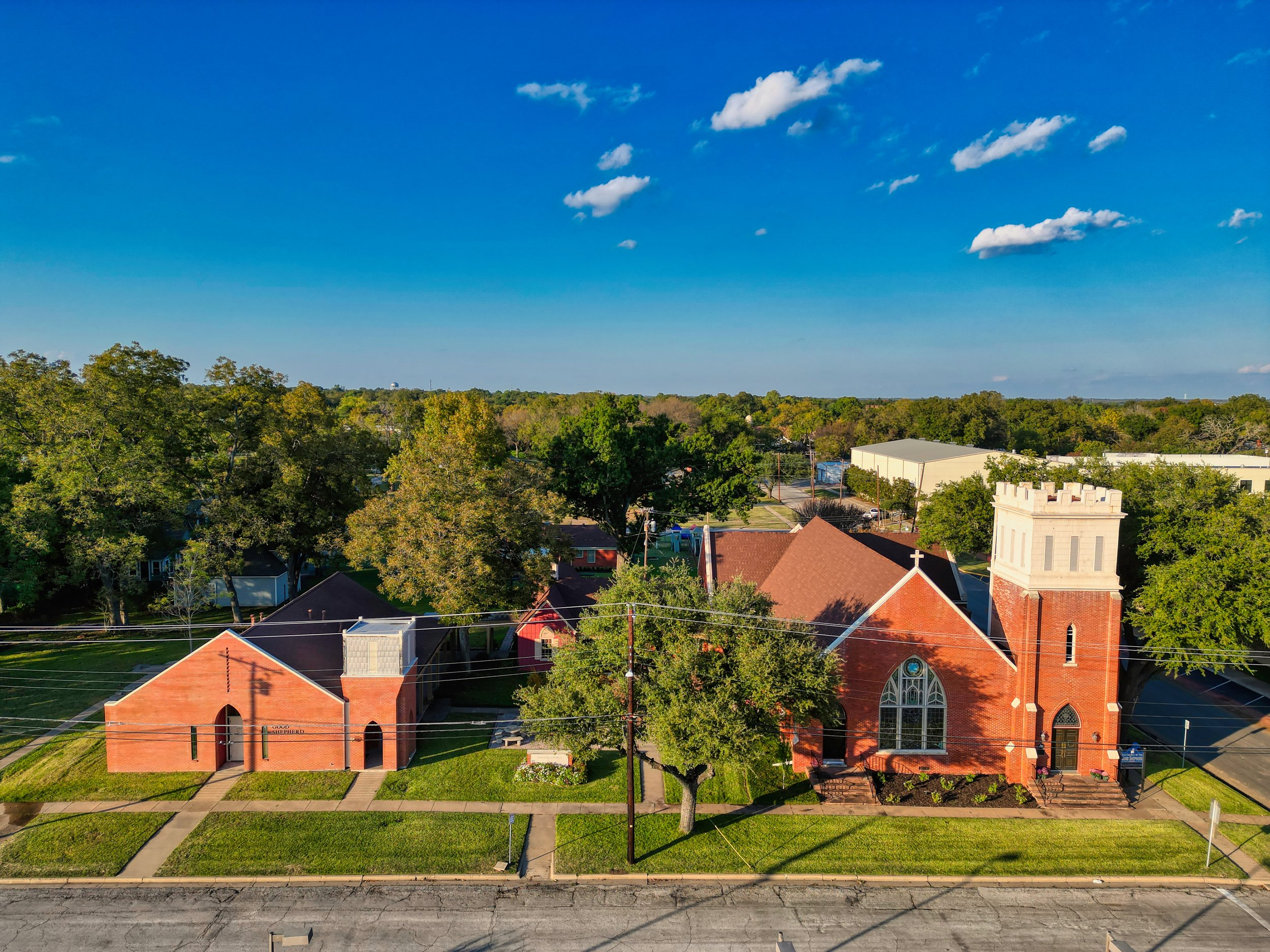
The Gospel: from the Scriptures in the Church for the world
Good Shepherd Episcopal
is a parish of The Episcopal Diocese of Dallas, and a member of the worldwide Anglican Communion. Our campus has been on the corner of College and Frances Street in Terrell since the year 1874.
While much has changed along the years, Good Shepherd’s identity and mission have remained the same: we are a people that witness to the gospel concerning the Son of God, Jesus Christ—-from the Holy Scriptures in the gathered Church for the life of the world.

The faith we confess:
The Nicene Creed
We believe in one God,
the Father, the Almighty,
maker of heaven and earth,
of all that is, seen and unseen.
We believe in one Lord, Jesus Christ,
the only Son of God,
eternally begotten of the Father,
God from God, Light from Light,
true God from true God,
begotten, not made,
of one Being with the Father.
Through him all things were made.
For us and for our salvation
he came down from heaven:
by the power of the Holy Spirit
he became incarnate from the Virgin Mary, and was made man.
For our sake he was crucified under Pontius Pilate;
he suffered death and was buried.
On the third day he rose again
in accordance with the Scriptures;
he ascended into heaven
and is seated at the right hand of the Father.
He will come again in glory to judge the living and the dead,
and his kingdom will have no end.
We believe in the Holy Spirit, the Lord, the giver of life,
who proceeds from the Father and the Son.
With the Father and the Son he is worshiped and glorified.
He has spoken through the Prophets.
We believe in one holy catholic and apostolic Church.
We acknowledge one baptism for the forgiveness of sins.
We look for the resurrection of the dead,
and the life of the world to come. Amen.
The Apostles’ Creed
I believe in God, the Father almighty,
maker of heaven and earth;
And in Jesus Christ his only Son our Lord;
who was conceived by the Holy Ghost,
born of the Virgin Mary,
suffered under Pontius Pilate,
was crucified, dead, and buried.
He descended into hell.
The third day he rose again from the dead.
He ascended into heaven,
and sitteth on the right hand of God the Father almighty.
From thence he shall come to judge the quick and the dead.
I believe in the Holy Ghost,
the holy catholic Church,
the communion of saints,
the forgiveness of sins,
the resurrection of the body,
and the life everlasting. Amen.
Particulars
-
We believe in one God. This God is a perfect and equal unity that is a plurality of persons: Father, Son, and Holy Spirit.
-
We believe Jesus Christ is the Son of God. He is begotten—not made. He is of one being with the Father. In the Incarnation, the Son of God became man and was born of the Virgin Mary. He is of one being with humanity. Thus, we believe that Jesus Christ is the God-man: in his one concrete person humanity and divinity subsist.
We believe that Jesus died on a cross and was resurrected on the third day, before ascending into heaven. By His death and resurrection, the reign of sin and death have been defeated; man has been reconciled to God and called to live under the reign of his rightful Lord—-Jesus Christ, the Son of God.
-
We believe that the Holy Scriptures contain all things necessary to salvation and are comprised of the canonical Books of the Old and New Testament. Like a treasure hidden in a field, the Holy Scriptures are the words in the which the Word is hidden and revealed. The Scriptures are “living and active” and thus able to address man in his particular historical situation. In them, God speaks the gospel, and the content of gospel-speech is Jesus Christ.
-
We believe that the Church is the Body of Christ, of which Jesus Christ is the Head, and is comprised of all those who have been baptized in the Name of the Trinity. The Church is governed by the historic three-fold order of ministry of bishop, priest, and deacon, which is maintained by the apostolic succession of bishops.
-
We believe that the Sacraments are outward and visible signs of inward and spiritual grace, and are thus the means by which God works within us for our salvation. The two greatest Sacraments given by Christ to the Church are Holy Baptism and the Holy Eucharist.
Holy Baptism is the Sacrament by which God adopts us as his children and makes us members of Christ's Body, the Church, and inheritors of the kingdom of God. The outward and visible sign in Baptism is water, in which the person is baptized in the Name of the Father, and of the Son, and of the Holy Spirit. The inward and spiritual grace in Baptism is union with Christ in his death and resurrection, birth into God's family the Church, forgiveness of sins, and new life in the Holy Spirit. In keeping with the ancient practice of the Church, we baptize infants so that they can share citizenship in the Covenant, membership in Christ, and redemption by God.
The Holy Eucharist is the Sacrament commanded by Christ for the continual remembrance of his life, death, and resurrection, until his coming again. It is the Church's sacrifice of praise and thanksgiving, whereby the sacrifice of Christ is made present, and in which he unites us to his one offering of himself. The outward and visible sign in the Eucharist is bread and wine, given and received according to Christ's command. The inward and spiritual grace in the Holy Communion is the Body and Blood of Christ given to his people, and received by faith.
-
The Episcopal Church finds its roots in the Church of England, which stretches all the way back to when England was evangelized in the 5th and 6th centuries by St. Augustine of Canterbury.
Since then, the Anglican Tradition continued to develop through the English Reformation of the 16th century and beyond, eventually expanding across the globe and intersecting with a diversity of cultures and places. Today, the Anglican Communion comprises the third largest communion of Christians in the world.
For us, it’s a real privilege to inherit the ancient faith and practice of the Church from our ancestors in the faith. It reminds us that we are engaging in an identifiable form of life: a particular way of conforming ourselves to the pattern of Christ.
In receiving this tradition, we are invited to immerse ourselves ever deeper in the “one continuous historic life” of the One, Holy, Catholic, and Apostolic Church. Everything we do – our doctrine, prayer, and our worship – flows out of that life.

